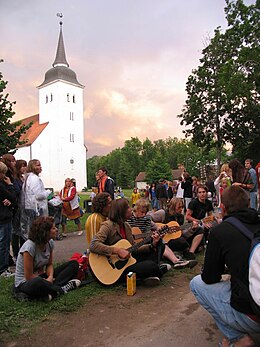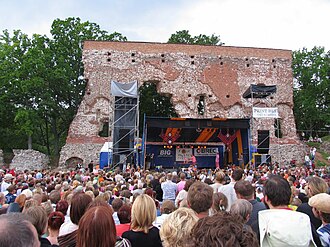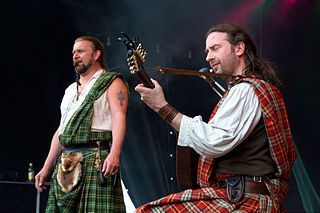
Celtic music is a broad grouping of music genres that evolved out of the folk music traditions of the Celtic people of Western Europe. It refers to both orally-transmitted traditional music and recorded music and the styles vary considerably to include everything from traditional music to a wide range of hybrids.
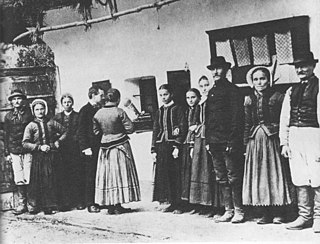
Folk music is a music genre that includes traditional folk music and the contemporary genre that evolved from the former during the 20th-century folk revival. Some types of folk music may be called world music. Traditional folk music has been defined in several ways: as music transmitted orally, music with unknown composers, music that is played on traditional instruments, music about cultural or national identity, music that changes between generations, music associated with a people's folklore, or music performed by custom over a long period of time. It has been contrasted with commercial and classical styles. The term originated in the 19th century, but folk music extends beyond that.

The Eurovision Song Contest 2002 was the 47th edition of the Eurovision Song Contest. It took place in Tallinn, Estonia, following the country's victory at the 2001 contest with the song "Everybody" by Tanel Padar, Dave Benton and 2XL. Organised by the European Broadcasting Union (EBU) and host broadcaster Eesti Televisioon (ETV), the contest was held at the Saku Suurhall on Saturday 25 May 2002. The contest was presented by Estonian opera singer Annely Peebo and actor Marko Matvere. It was the first Eurovision Song Contest held in one of the former Soviet republics.
Midsummer is the period of time in the middle of the summer. The exact dates vary among different cultures, but is primarily held close to the summer solstice. The celebration predates Christianity, and has existed under different names and traditions around the world.

Viljandi is a town and municipality in southern Estonia with a population of 17,407 in 2019. It is the capital of Viljandi County and is geographically located between two major Estonian cities, Pärnu and Tartu. The town was first mentioned in 1283, upon being granted its town charter by Wilhelm von Endorpe. The town became a member of the Hanseatic League at the beginning of the 14th century, and is one of five Estonian towns and cities in the league. The once influential Estonian newspaper Sakala was founded in Viljandi in 1878.

Europe, the westernmost portion of Eurasia—is often divided into regions and subregions based on geographical, cultural or historical criteria. Many European structures currently exist. Some are cultural, economic, or political; examples include the Council of Europe, the European Broadcasting Union with the Eurovision Song Contest, and the European Olympic Committees with the European Games. Russia dominates the continent by both area and population; spanning roughly 40% of its total landmass, with over 15% of its total population.
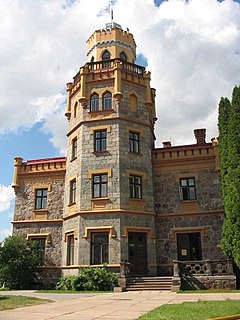
Sigulda is a town in the Vidzeme region of Latvia, 53 kilometres from the capital city Riga.

Religion in Europe has been a major influence on today's society, art, culture, philosophy and law. The largest religion in Europe is Christianity, but irreligion and practical secularisation are strong. Three countries in Southeastern Europe have Muslim majorities. Ancient European religions included veneration for deities such as Zeus. Modern revival movements of these religions include Heathenism, Rodnovery, Romuva, Druidry, Wicca, and others. Smaller religions include the Dharmic religions, Judaism, and some East Asian religions, which are found in their largest groups in Britain, France, and Kalmykia.

Christianity is the largest religion in Europe. Christianity has been practiced in Europe since the first century, and a number of the Pauline Epistles were addressed to Christians living in Greece, as well as other parts of the Roman Empire.
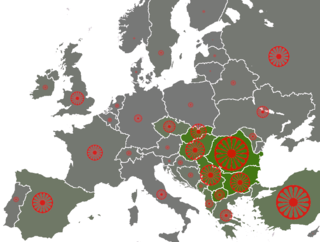
The Roma people have several distinct populations, the largest being the Roma and the Iberian Calé or Caló, who reached Anatolia and the Balkans in the early 12th century, from a migration out of the Indian subcontinent beginning about 1st century - 2nd century AD. They settled in the areas of present-day Turkey, Greece, Serbia, Romania, Croatia, Moldova, Bulgaria, North Macedonia, Hungary, Albania, Kosovo, Bosnia and Herzegovina, Czech Republic, Slovenia and Slovakia, by order of volume, and Spain. From the Balkans, they migrated throughout Europe and, in the nineteenth and later centuries, to the Americas. The Roma population in the United States is estimated at more than one million.

Europeade is the largest festival of European folk culture, held in a different European country each year. The last Europeade was held in Turku, Finland in 2017. The year before that it was held in Namur, Belgium in 2016.
Irish people in mainland Europe are members of the Irish diaspora who reside in mainland Europe.

Türi Parish is a rural municipality in Järva County, Estonia.
Paramount International Networks (PIN) is the international division of Paramount Global. The division oversees the production, broadcasting and promotion of key Paramount's brands outside of the United States. These brands include Paramount Network, Comedy Central, MTV, Nickelodeon, BET and Colors TV, as well as CBS-branded channels, which are co-owned with AMC Networks International. PIN also owns a 30% stake in the Rainbow S.p.A. animation studio in Italy, as well as a 49% stake in an Indian joint venture with domestic partner TV18, Viacom18.

Sigulda Municipality is a municipality in Vidzeme, Latvia. The municipality was formed in 2003 by merging Sigulda town, Sigulda Parish and More Parish. In 2009 it absorbed Allaži parish, too; the administrative centre being Sigulda. The population in 2020 was 17,992.

Alcohol laws are laws in relation to the manufacture, use, being under the influence of and sale of alcohol or alcoholic beverages that contains ethanol. Common alcoholic beverages include beer, wine, (hard) cider, and distilled spirits. The United States defines an alcoholic beverage as "any beverage in liquid form which contains not less than one-half of one percent of alcohol by volume", but this definition varies internationally. These laws can restrict those who can produce alcohol, those who can buy it, when one can buy it, labelling and advertising, the types of alcoholic beverage that can be sold, where one can consume it, what activities are prohibited while intoxicated, and where one can buy it. In some cases, laws have even prohibited the use and sale of alcohol entirely, as with Prohibition in the United States from 1920 to 1933.

University of Tartu Viljandi Culture Academy is an Estonian institution of higher education, situated in the provincial town of Viljandi, central Estonia. The UT Viljandi Culture Academy merged with the University of Tartu in 2005. The UT VCA has been teaching professional higher education and performing applied research within information science, culture education and creative arts since 1952. The academy has about 1000 students, half of whom are open university students. The teaching and instruction are based on the continuity and sustainability of Estonian native culture enriched by new impulses which widen the notion of traditional culture. As of 2021, the Director of the institution is Juko-Mart Kõlar.
The Brigham Young University International Folk Dance Ensemble is a Brigham Young University (BYU) performing group that performs folk dances from many parts of the world. They were established as a small performing group in 1959 by Mary Bee Jensen and have grown to include around 180 participants. However, about 30 of the dancers participate in the touring ensemble which has performed in many locations around the world including at the cultural festival held in connection with the 1988 Olympics in Seoul, Korea and at the opening ceremonies in the 2002 Winter Olympics in Salt Lake City.
2015 in continental European music in geographical order.
